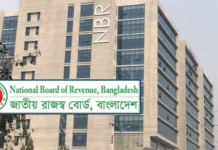The Business Standard 25 August 2020

Eleven banks – four state-owned and seven from the private sector – faced a combined provision shortfall of Tk10,177 crore at the end of June this year.
As per the regulator’s instructions, banks must keep provisions against their loans and risk-weighted assets; so that depositors feel certain they will get their money back if banks fail to recover loans and bad assets.
According to the central bank’s latest approved data, BASIC Bank, a state-run financial institution, topped the list with a provision shortfall of Tk3,314 crore at the end of June this year.
Provision shortfall of AB Bank, another private sector lender, stood at Tk1,214 crore.
The rest of the banks have been able to keep more provisions than the amount required by the financial regulator, and thus the banking sector’s total provision shortfall stood at Tk4,499 crore at the end of June 2020.
On Sunday, Bangladesh Bank Governor Fazle Kabir approved the loan classification data of the April-June quarter.
As per the data, the banking sector’s default loans soared by Tk3,606 crore in the second quarter of this year despite a waiver on loan classification, and the total amount of the default loans stood at Tk96,116 crore at the end of June this year.
A total 9.16 percent of the total outstanding loans of the country have defaulted.
As per the central bank’s regulation, banks have to keep from 0.25 to five percent provisions against a regular loan.
When a loan turns substandard, the first step of it defaulting, the bank has to keep 20 percent of the money of the loan amount as a provision from their profits.
“If the loan is classified as doubtful, the second step of being in default, then the bank concerned has to keep a 50 percent provision against the loan amount,” added the regulation.
Banks have to keep a cent percent provision against a loan when it is classified as defaulted.
As per the regulation of the Bangladesh Bank, if a bank does not have the ability to keep the required provision against its total loan, then it cannot declare dividends to its shareholders.
“However, for the last few years, there is a practice in the country to declare dividends after securing approval from the central bank; on condition of keeping required provisions over the next two to three years,” Syed Mahbubur Rahman, managing director of Mutual Trust Bank, told The Business Standard.
The veteran banker said they have also received permission from the central bank to keep the provision step-by-step.









